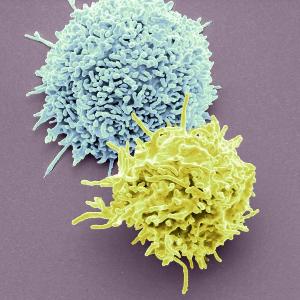LMU involved in a new Collaborative Research Center
26 May 2021
The Deutsche Forschungsgemeinschaft has approved funding for a new CRC on immunotherapy, while a second large-scale project has been extended.
26 May 2021
The Deutsche Forschungsgemeinschaft has approved funding for a new CRC on immunotherapy, while a second large-scale project has been extended.

T-cells will be genetically modified for a new kind of immunotherapy. | © IMAGO / Science Photo Library
The new transregional Collaborative Research Center (CRC) – TRR-338 LETSIMMUN (which stands for Lymphocyte Engineering for Therapeutic Synthetic Immunity) – will be based in Munich and Würzburg. The new CRC, in which LMU researchers will play a significant role, is intended to develop new concepts in the field of adoptive T-cell therapy, with the aim of modifying the function of immune cells so as to confer therapeutic synthetic immunity on patients. The basic idea is to genetically alter lymphocytes in ways that enable them to activate the body’s own immune defenses in a precisely regulatable manner. The scientists involved in the project plan to utilize a variety of lymphocyte-engineering technologies to optimize the structures of specific receptors on T-cells, and control their expression in an intentional temporal fashion. In addition, various regulatory and fail-safe mechanisms will be incorporated into these synthetic T-cells, in order to ensure that they are resistant to suppression and that their activities can be closely and safely monitored. The ultimate goal of the CRC is to establish immunotherapy as a safe, effective and versatile mode of treatment that can be applied to a broad range of disease conditions, including cancer therapy, bacterial and viral infections and autoimmune disorders. The Coordinator of the new CRC/Transregio is Professor Dirk Busch of the Technical University of Munich (TUM). The Local Coordinator at LMU is Professor Tobias Feuchtinger, Head of the Department of Pediatric Hematology, Oncology, Hemostaseology and Stem Cell Transplantation at Dr. von Hauner Children’s Hospital (which is part of the LMU Medical Center). The University of Würzburg is also a partner in the new venture.
In addition to setting up the new CRC, the DFG has also agreed to a second funding period for the existing CRC on Chromatin Dynamics at LMU (Coordinator: Prof. Dr. Peter Becker, Biomedical Center, LMU).
LMU researchers are also active participants in a second CRC Transregio on The Adrenal Gland: A Central Relay Station in Health and Disease (Coodinator: Professor Dr. Stefan R. Bornstein, TU Dresden; other collaborators: LMU Munich and Würzburg University).